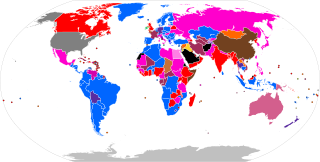
An election is a formal group decision-making process by which a population chooses an individual or multiple individuals to hold public office.
Proportional representation (PR) characterizes electoral systems in which divisions in an electorate are reflected proportionately in the elected body. The concept applies mainly to geographical and political divisions of the electorate.

Party-list proportional representation is a subset of proportional representation electoral systems in which multiple candidates are elected through their position on an electoral list. They can also be used as part of mixed-member electoral systems.

A political party is an organization that coordinates candidates to compete in a particular country's elections. It is common for the members of a party to hold similar ideas about politics, and parties may promote specific ideological or policy goals.

A one-party state, single-party state, one-party system, or single-party system is a type of sovereign state in which only one political party has the right to form the government, usually based on the existing constitution. All other parties are either outlawed or allowed to take only a limited and controlled participation in elections. Sometimes the term de facto one-party state is used to describe a dominant-party system that, unlike the one-party state, allows democratic multiparty elections, but the existing practices or balance of political power effectively prevent the opposition from winning power.
In political science, a multi-party system is a political system in which multiple political parties across the political spectrum run for national elections, and all have the capacity to gain control of government offices, separately or in coalition. Apart from one-party-dominant and two-party systems, multi-party systems tend to be more common in parliamentary systems than presidential systems and far more common in countries that use proportional representation compared to countries that use first-past-the-post elections. Several parties compete for power and all of them have reasonable chance of forming government.

In a first-past-the-post electoral system (FPTP); formally called single-member plurality voting (SMP) when used in single-member districts, or (informally) choose-one voting in contrast to ranked voting or score voting), voters cast their vote for a candidate of their choice, and the candidate who receives the most votes wins. FPTP is a plurality voting method, and is primarily used in systems that use single-member electoral divisions. FPTP is used as the primary form of allocating seats for legislative elections in about a third of the world's countries, mostly in the English-speaking world. The phrase is a metaphor from British horse racing, where there is a post at the finish line.

Open list describes any variant of party-list proportional representation where voters have at least some influence on the order in which a party's candidates are elected. This is as opposed to closed list, which allows only active members, party officials, or consultants to determine the order of its candidates and gives the general voter no influence at all on the position of the candidates placed on the party list. Additionally, an open list system allows voters to select individuals rather than parties. Different systems give the voter different amounts of influence. The voter's choice is usually called preference vote; the voters are usually allowed one or more preference votes to the open list candidates.

The Uttar Pradesh Legislative Assembly is the lower house of the bicameral legislature of Uttar Pradesh. There are 403 seats in the house filled by direct election using a single-member first-past-the-post system.

An electoral system or voting system is a set of rules that determine how elections and referendums are conducted and how their results are determined. Political electoral systems are organized by governments, while non-political elections may take place in business, non-profit organisations and informal organisations. These rules govern all aspects of the voting process: when elections occur, who is allowed to vote, who can stand as a candidate, how ballots are marked and cast, how the ballots are counted, how votes translate into the election outcome, limits on campaign spending, and other factors that can affect the result. Political electoral systems are defined by constitutions and electoral laws, are typically conducted by election commissions, and can use multiple types of elections for different offices.








